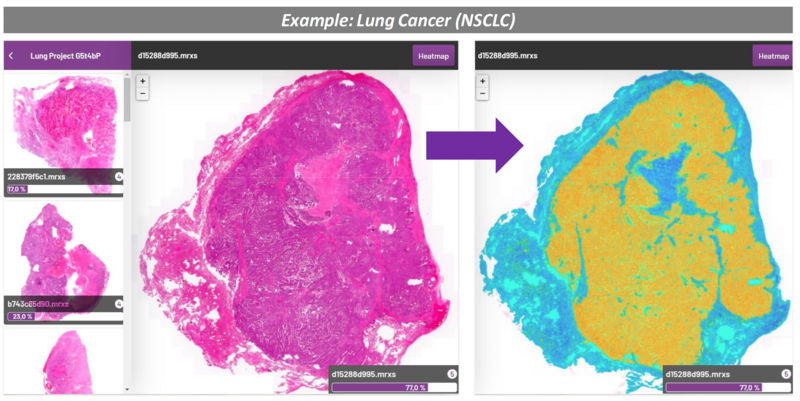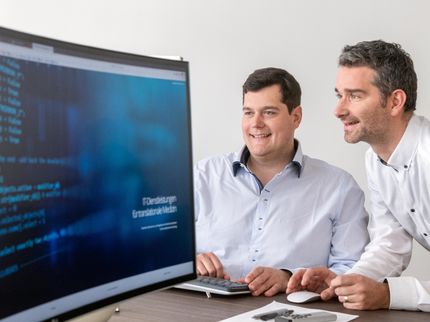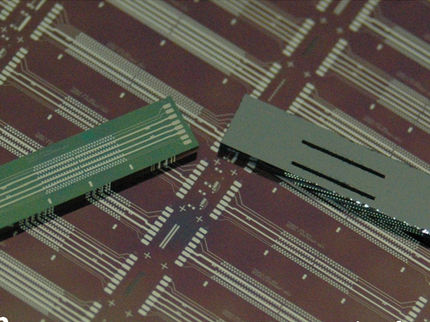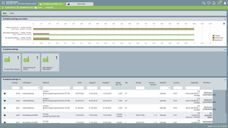Precise diagnostics with artificial intelligence
BIH Digital Health Accelerator guides Aignostics GmbH through its spin-off
Advertisement
The usual way to determine if a suspicious lump is cancerous involves microscopic examination in a pathology laboratory. To ease the workload of pathologists who face a rising number of cancer cases and increasingly finer molecular details and to enable tailored treatments, scientists at the Institute of Pathology of Charité – Universitätsmedizin Berlin have teamed up with colleagues at TU Berlin to develop a digital imaging analysis system that uses artificial intelligence (AI) to evaluate microscopic images.

Berliner Institut für Gesundheitsforschung
The Digital Health Accelerator (DHA) of the Berlin Institute of Health (BIH) is helping the scientists to make the long-term research project a translational success. The DHA is a support and development program of BIH Innovations, the joint technology transfer unit of the BIH and Charité.
Professor Frederick Klauschen studied physics and medicine, “a good combination for pushing forward the digitalization of healthcare,” says the Deputy Director of Charité’s Institute of Pathology on Campus Charité Mitte. Even during his pathology residency, he had thought about how computer-assisted techniques could be used to improve diagnostics. “With ever more samples from ever more patients, digital assistant systems can help to avoid mistakes,” Klauschen explains. “And humans are not as good at determining what percentage of tissue is affected by cancer or what percentage of tumor cells contain a certain therapeutically relevant receptor. Here our ‘digital colleague’ can provide valuable help, because it is both faster and more precise when it comes to quantitative analysis.”
In order to train the “digital colleagues” in diagnostic pathology, the team led by Klauschen collaborated with lots of human colleagues from various university hospitals. They mapped the pathological changes on thousands of digital microscopic images of tissue sections. The pathologists “fed” the software with these findings, so that it could “learn” to distinguish, for example, tumor tissue from healthy tissue. “We performed these so-called annotations for different diseases,” Klauschen says. The scientists have so far trained the software to reliably identify lung, breast and colon cancer as well as immune cells in tumor tissue and various tumor markers. And the technique is not limited to cancer detection: It can also be used to analyze infections as well as degenerative, connective tissue and autoimmune diseases, “anything that causes visible changes in tissue.”
Explainable AI
“But there is also something just as important: The system we develop can show us how the AI makes its decisions,” explains Professor Klaus-Robert Müller, co-founder of Aignostics and Chair of the Machine Learning Department at TU Berlin. “The software creates so-called heat maps, which show precisely which cells or image areas were decisive for the algorithm’s classification of the tissue as cancerous or non-cancerous.” By using these heat maps the pathologists can assess whether the AI analysis is plausible. But the technology also opens up entirely new possibilities for research. If, for example, one trains the AI with the positive and negative courses of a particular therapy, the resulting heat maps could enable pathologists to discover new characteristics (‘biomarkers’) that predict therapeutic success. “We call this approach ‘explainable AI’”, says Müller.
In routine diagnostics the AI system promises not only to save time and help avoid mistakes, but also to pave the way for personalized medicine. Therapeutic decisions increasingly require the precise detection and quantification of certain characteristics in tissue samples. The software developed by the scientists is already being used in diagnostics at Charité’s Institute of Pathology. Other institutes and clinics plan to follow suit; the software is currently in the process of being certified for broad use.
Other applications include research and drug development
“Our software is also suitable for the expensive and lengthy approval process for new drugs,” Klauschen says. “If, for example, a pharmaceutical company develops a new active substance, the company must carry out extensive clinical trials – often in several countries – to show that the drug works in both animals and humans and has an acceptable side-effect profile. Pathological studies are an important component of this research. And it is precisely here that our software can help.” The first collaborations on the development of active substances are already under way with various manufacturers. Klauschen adds: “Our aim is also to develop so-called companion diagnostics.” This refers to the use of a targeted drug in combination with a suitable target molecule, for example, to treat a tumor: The physician can only prescribe the drug if a suitable target molecule is present. “If our software could help detect the target molecule faster and more accurately, this would be great for both patients and manufacturers,” Klauschen explains.
BIH Digital Health Accelerator supports the development of digital solutions
It’s a long way from the initial idea to a successful spin-off. That is why the BIH offers help at exactly this interface between research and application through its Digital Health Accelerator program. “The BIH is supporting innovators from Charité and the Max Delbrück Center to develop their concepts into digital products and to translate these into clinical practice. In addition to a licensing arrangement or an industrial cooperation, this can include a spin-off and thus create jobs,” says Tim Huse, head of the Digital Health Accelerator at BIH Innovations. “The focus in this project was mainly on rounding out the team, developing the business strategy and the product, and preparing for the spin-off.” The support provided by the Digital Health Accelerator program and the BIH Innovations team ranges from financial aid to coaching and mentoring by experts and access to networks of talent, development partners, industry players and investors, to the provision of a coworking space for innovation and translation activities and in-depth guidance for spin-offs.
Research and routine diagnostics
The Aignostics team currently consists of twelve employees as well as a network of pathologists and research partners, who are helping with development and continuously testing the software. “But we expect to be able to significantly increase the size of our team later this year,” says CEO Viktor Matyas. “We will then be in a position to expand the current applications and develop new ones,” adds Dr. Maximilian Alber, the company’s CTO. What is especially important to Frederick Klauschen is the close proximity to routine clinical practice: “The development of our solution is clearly geared to meeting the needs of routine diagnostics and clinical medicine, and since I use the software on a daily basis, we can immediately identify ways to improve it. We hope this is the best way to help patients.”
Other news from the department science
These products might interest you
Most read news
More news from our other portals
Something is happening in the life science industry ...
This is what true pioneering spirit looks like: Plenty of innovative start-ups are bringing fresh ideas, lifeblood and entrepreneurial spirit to change tomorrow's world for the better. Immerse yourself in the world of these young companies and take the opportunity to get in touch with the founders.
See the theme worlds for related content
Topic world Diagnostics
Diagnostics is at the heart of modern medicine and forms a crucial interface between research and patient care in the biotech and pharmaceutical industries. It not only enables early detection and monitoring of disease, but also plays a central role in individualized medicine by enabling targeted therapies based on an individual's genetic and molecular signature.

Topic world Diagnostics
Diagnostics is at the heart of modern medicine and forms a crucial interface between research and patient care in the biotech and pharmaceutical industries. It not only enables early detection and monitoring of disease, but also plays a central role in individualized medicine by enabling targeted therapies based on an individual's genetic and molecular signature.




















































